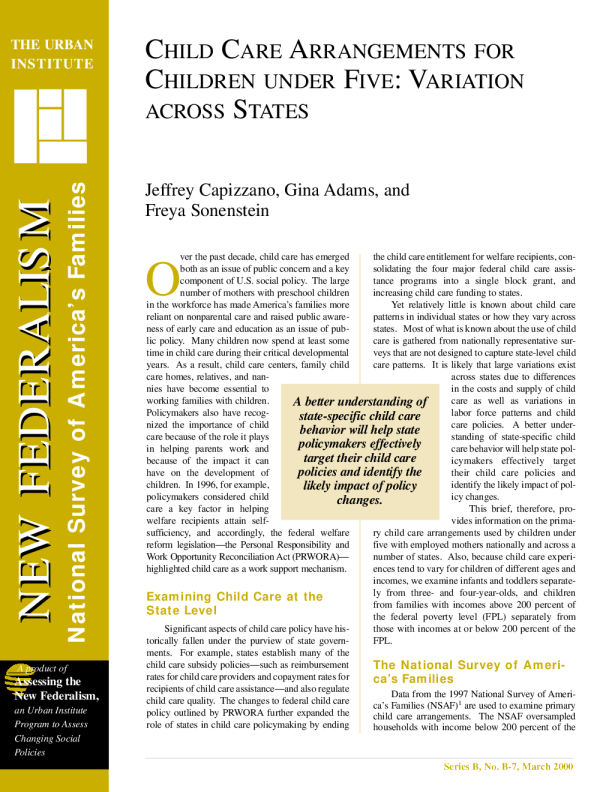Child Care Assistance Under Welfare Reform: Early Responses by the States

An Urban InstituteProgram to AssessChanging Social PoliciesChild CareAssistanceunder WelfareReform: EarlyResponses by the StatesChild CareAssistanceunder WelfareReform: EarlyResponses by the StatesSharon K. LongThe Urban InstituteGretchen G. KirbyChild Trends, Inc.Robin KurkaThe Urban InstituteShelley WatersThe Urban InstituteOccasional Paper Number 15Assessingthe NewFederalism An Urban InstituteProgram to AssessChanging Social PoliciesChild CareAssistanceunder WelfareReform: EarlyResponses by the StatesSharon K. LongThe Urban InstituteGretchen G. KirbyChild Trends, Inc.Robin KurkaThe Urban InstituteShelley WatersThe Urban InstituteAssessingthe NewFederalismOccasional Paper Number 15The UrbanInstitute2100 M Street, N.W.Washington, D.C. 20037Phone: 202.833.7200Fax: 202.429.0687E-Mail: paffairs@ui.urban.orghttp://www.urban.org Copyright qSeptember 1998. The Urban Institute. All rights reserved. Except for short quotes, no part of this bookmay be reproduced in any form or utilized in any form by any means, electronic or mechanical, including photo-copying, recording, or by information storage or retrieval system, without written permission from The Urban Institute.This report is part of The Urban Institute’s Assessing the New Federalismproject, a multi-year effort to monitor andassess the devolution of social programs from the federal to the state and local levels. Alan Weil is the project direc-tor and Anna Kondratas is the deputy director. The project analyzes changes in income support, social services, andhealth programs. In collaboration with Child Trends, Inc., the project studies child and family well-being.The project has received funding from the Annie E. Casey Foundation, the W.K. Kellogg Foundation, the Henry J.Kaiser Family Foundation, the Ford Foundation, the John D. and Catherine T. MacArthur Foundation, the CharlesStewart Mott Foundation, the Commonwealth Fund, the Stuart Foundation, the Robert Wood Johnson Foundation,the Weingart Foundation, the McKnight Foundation, the Fund for New Jersey, and the Rockefeller Foundation.Additional funding is provided by the Joyce Foundation and the Lynde and Harry Bradley Foundation through asubcontract with the University of Wisconsin at Madison.The authors would like to thank the many state and local officials and others who participated in the interviews andprovided the information contained in this report. We also acknowledge the Urban Institute and Child Trends staffwho conducted the site visits and prepared the background papers that served as the source for the state-specific infor-mation. We are particularly grateful for the many contributions of Sandra Clark. Assessing the New FederalismAssessing the New Federalismis a multi-year Urban Institute projectdesigned to analyze the devolution of responsibility for social pro-grams from the federal government to the states, focusing primarilyon health care, income security, job training, and social services.Researchers monitor program changes and fiscal developments. In collaborationwith Child Trends, Inc., the project studies changes in family well-being. Theproject aims to provide timely, nonpartisan information to inform public debateand to help state and local decisionmakers carry out their new responsibilitiesmore effectively.Key components of the project include a household survey, studies of poli-cies in 13 states, and a database with information on all states and the Districtof Columbia, available at the Urban Institute’s Web site. This paper is one in aseries of occasional papers analyzing information from these and other sources. ContentsIntroduction 1Changes in Child Care Assistance under PRWORA 2Opportunities to Improve the Administration of Child Care Assistance 5State Choices in Program Design 8Collaboration between Child Care and Early Childhood Education 14Conclusions 17Notes 19About the Authors 23 Child Care Assistance under Welfare Reform: Early Responses by the StatesIntroductionThe Personal Responsibility and Work Opportunity Reconciliation Actof 1996 (PRWORA) fundamentally changed federal child care assis-tance programs for low-income families. The legislation eliminatedfederal child care entitlements and consolidated the major sources offederal child care subsidies for low-income children into a single block grantto states—the Child Care and Development Fund (CCDF). That block grant pro-gram gives states greater flexibility in designing their child care assistance pro-grams, providing an opportunity to streamline the complex child care systemthat was in place before PRWORA and to design a system of assistance thatbetter meets the states’ child care needs and objectives. This report describes the child care assistance system in place just beforePRWORA and provides some early indications of how states will use theincreased freedom of the CCDF to develop new systems of assistance. Thisinformation is particularly useful in light of recent proposals by the




